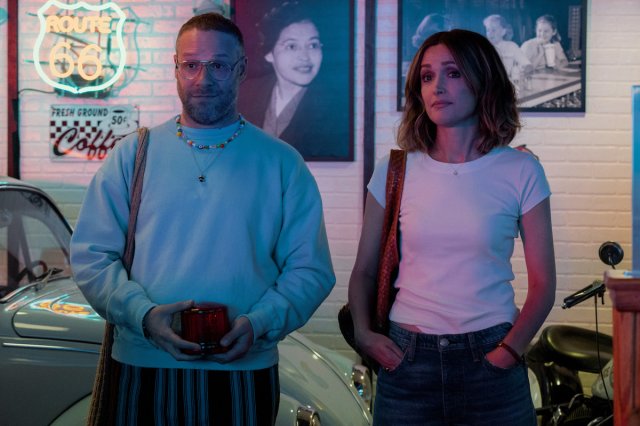
Apple TV+ Series ‘Platonic’ Nails True Friendship With a Healthy Dose of Hostility
By ![]() Josh Lezmi
Josh Lezmi
The Apple TV+ series ‘Platonic,’ starring Rose Byrne and Seth Rogen, is a loveable show that spotlights what true friendship looks like.
The Apple TV+ original series Platonic follows Sylvia (Rose Byrne) and Will (Seth Rogen) — long-lost besties who rekindle their friendship after Will’s divorce. A little nudge from Sylvia’s husband leads her to reach out to Will to lend an ear (or a shoulder to cry on). Because Sylvia never liked Will’s wife, which was the catalyst for their rift, there’s also a bit of a juicy “I told you so” subtext bubbling beneath the selfless surface.
The series — perfectly balancing humor and heart — showcases a guy-girl dynamic that is not one ounce sexual, making for a unique and compelling narrative in a sex-crazed age of television. Yet, the guy-girl setup is merely a fraction of the show’s bold foundation. When it comes to depicting best friends — those who can be apart for years yet retain an unshakeable bond — the writers (Nicholas Stoller and Francesca Delbanco) nail it.
Sylvia and Will instantly become the devil-may-care duo of your glory days. Their friendship — no matter how much tension may need resolving — oozes out of the screen, permeating your living room to create that same effervescence you feel when your college pals come knocking on your door. But why? How does the show — within mere minutes — manifest such (sexless) intimacy?
Controversial opinion: the deepest of friendships boast a little hostility
Aside from the unparalleled chemistry between Byrne and Rogen, what has this series done to drive this platonic pair right through your heart? It’s the hostility. It’s the instances of animosity. The little bit of aggravation that festers between the two. There is an understood (yet never verbally communicated) safety that exists in the dynamic. And, it is this very knowledge that allows them to speak openly — to call out the other’s nonsense with fervor. And, then, instantly return to baseline to grab a burger and french fries.
A moment in episode one indicates exactly what viewers need to know about this pair going into the rest of the series. Niceties do not drive this dynamic. They are not cuddly confidantes. They are combative ones.

In episode one, Will and Sylvia rekindle their friendship, only to end the night cursing each other out and flipping each other off as Sylvia gets in an Uber. However, earlier in the night, Sylvia confessed to Will that sex with her husband takes too long — a whole “half hour.” And, well, Will takes the opportunity to share a little secret that may assist in speeding the process along. He tells her about a time that he was with a woman who punched him in the lower back (right near the kidneys) during the intimate act, and he “came instantaneously.”
So, later that night, Sylvia takes it upon herself to give the move a go. It doesn’t work. Yet, despite the huge argument she and Will had mere moments ago, she must text him, “That punch did not work, asshole.” Will then expresses his surprise that she gave it a shot, considering he made the whole thing up. The conversation then comedically forays into Sylvia letting Will know that he will pay for his transgression. From utter aggravation and disdain to lighthearted comedic banter within moments.

This very instant lays the foundation for Platonic, and in the very next episode, viewers see that Sylvia has changed Will’s contact name to “asshole.” This is not only comedic gold via seamless callback but also friendship-fortifying. She may have him in her phone as “asshole,” but she still picks up when he calls! She loves him like a brother, and just like siblings, these two fight with reckless abandon. They call each other names that many would deem unforgivable. And, like siblings, no apologies are necessary. They simply move on.
How the guy-girl dynamic benefits the combative friendship between Will and Sylvia
The guy-girl dynamic only augments the hostile-besties storytelling approach, as there is a slight “battle of the sexes” throughline beneath the pair’s disagreements. Will even asserts, when arguing with Sylvia about their falling out, it’s different with girls who don’t like your wife (as opposed to guys who may not). She calls him out on this, as she should. Why is it different? Friends are friends. This is a sexist viewpoint — one that lacks a factual basis yet continues to thrive under social orthodoxy alone. Come on. It’s 2023.
In the end, via a comedic friendship, the show posits that men and women are not all that different. We have merely been programmed to believe we are. Men and women may be prone to disagree, prone to see conflicts from polar perspectives, and prone to handle situations via different methods, but whether this is indoctrination or instinct is the question.

Via the disagreements between Sylvia and Will — and the way they stand toe-to-toe with one another (as equals with no sexual chemistry) — Platonic succeeds in its mission to convince viewers that yes, unlike in When Harry Met Sally, guys and girls can be just friends. And it doesn’t look all that different from girl-girl and guy-guy pairs. There may be more disagreements, more misunderstandings, and a little bit more mind-numbing aggravation, as life is not the same for the straight white male and his female counterpart. They don’t walk the same earth.
New episodes of Platonic premiere Wednesday on AppleTV+.











